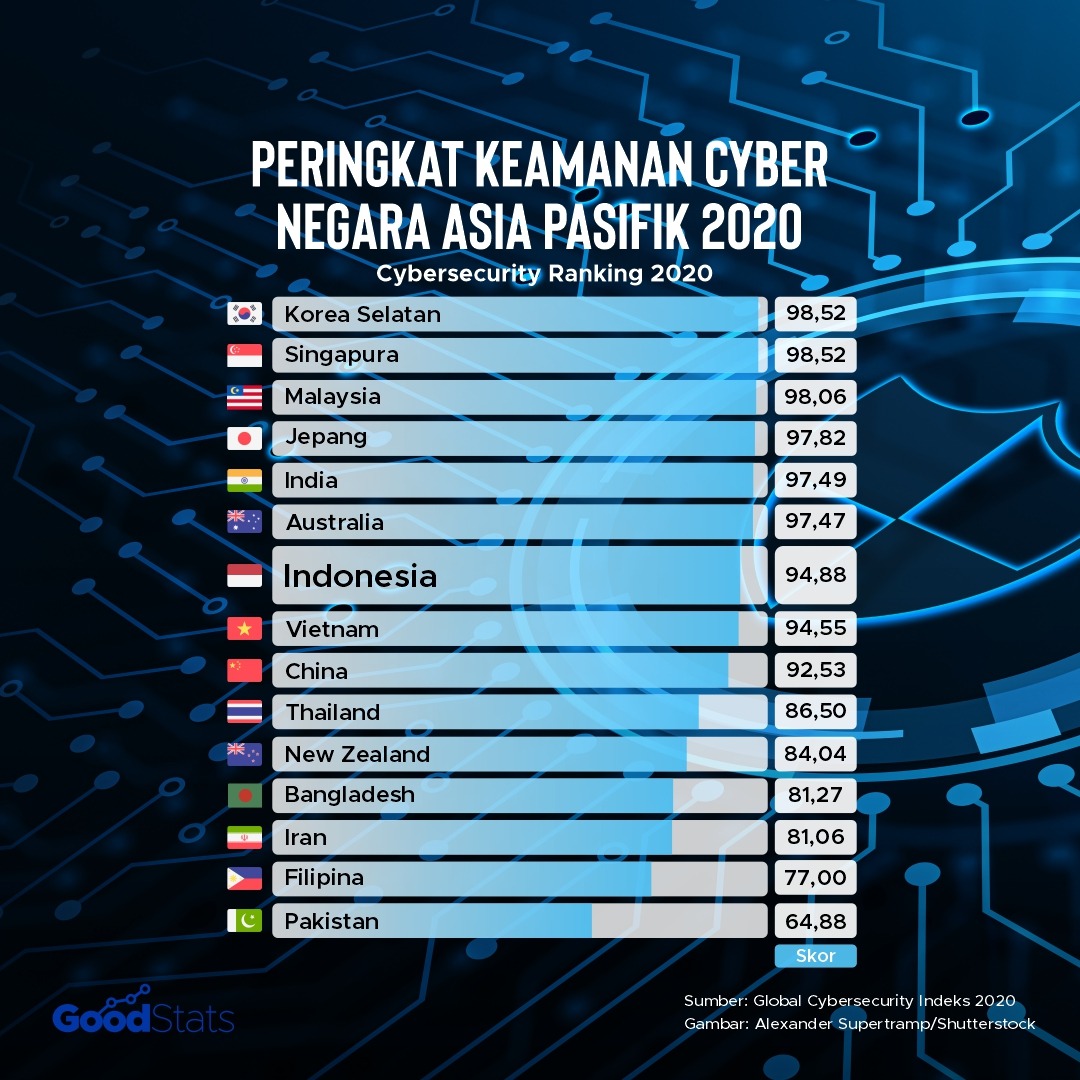Delving into keamanan siber indonesia, this introduction immerses readers in a unique and compelling narrative that explores the current state of cybersecurity in Indonesia. With a focus on the importance of protecting individuals, organizations, and the nation as a whole, this overview highlights the potential consequences of cyber threats and attacks.
Furthermore, it examines the major challenges faced by Indonesia in the realm of cybersecurity, including vulnerabilities in critical infrastructure and the impact of cybercrime on businesses and individuals. The discussion also sheds light on the initiatives taken by the government to enhance cybersecurity, the significance of cybersecurity education and awareness, and the future trends and technologies that will shape the field.
Introduction to Cybersecurity in Indonesia
Cybersecurity is a critical aspect in today’s digital world, and Indonesia is no exception. As one of the largest and fastest-growing digital economies in Southeast Asia, the country faces numerous cyber threats and attacks on a daily basis. It is essential for individuals, organizations, and the nation as a whole to prioritize cybersecurity to safeguard sensitive information, protect critical infrastructure, and ensure the overall well-being of its citizens.
The Current State of Cybersecurity in Indonesia
Despite the growing awareness of cybersecurity, Indonesia still faces significant challenges in this area. The country has witnessed a rise in cybercrime activities, ranging from data breaches and identity theft to ransomware attacks and phishing scams. These threats not only pose risks to individuals and businesses but also have the potential to disrupt government operations and compromise national security.
The Importance of Cybersecurity
Cybersecurity plays a vital role in safeguarding individuals, organizations, and the nation as a whole. It helps protect sensitive personal information, such as financial details and social security numbers, from falling into the wrong hands. By implementing robust cybersecurity measures, businesses can safeguard their intellectual property, customer data, and financial assets.
Furthermore, a strong cybersecurity framework is crucial for the government in protecting critical infrastructure, such as power grids, transportation systems, and communication networks.
Potential Consequences of Cyber Threats and Attacks, Keamanan siber indonesia
The consequences of cyber threats and attacks can be far-reaching and devastating. Individuals may suffer from financial loss, identity theft, and reputational damage. Organizations can face significant financial losses, damage to their brand reputation, and regulatory penalties. At a national level, cyber attacks can disrupt essential services, compromise sensitive government data, and even pose a threat to national security.
It is imperative for all stakeholders to understand the potential consequences and work together to prevent and mitigate cyber threats.
Cybersecurity Challenges in Indonesia
Indonesia faces several major cybersecurity challenges that pose threats to its critical infrastructure, businesses, and individuals. These challenges stem from various vulnerabilities and the increasing sophistication of cybercriminals and hackers.
Vulnerabilities in Critical Infrastructure
Indonesia’s critical infrastructure, including telecommunications, banking, and government systems, is vulnerable to cyber attacks. The increasing reliance on digital technologies and interconnected networks has made these sectors attractive targets for hackers. Weaknesses in these systems can lead to significant disruptions and financial losses.
- Telecommunications: The telecommunications sector plays a crucial role in Indonesia’s digital economy. However, it is susceptible to cyber attacks that can disrupt communication networks, compromise sensitive data, and affect the availability of essential services.
- Banking: The banking sector is another prime target for cybercriminals due to the valuable financial information it holds. Cyber attacks on banks can result in unauthorized access to customer accounts, financial fraud, and identity theft.
- Government Systems: Government systems store sensitive data and provide essential services to the public. Breaches in these systems can lead to unauthorized access to classified information, data manipulation, and disruption of government operations.
Impact of Cybercrime and Hacking
Cybercrime and hacking have significant consequences for businesses and individuals in Indonesia.
Former Indonesian President Susilo Bambang Yudhoyono (SBY) represented the alumni of the Indonesian Armed Forces Academy (AKABRI) in expressing their support and prayers for the success of Prabowo Subianto in leading the nation. SBY, as a representative of the AKABRI alumni, stated that they believe in Prabowo’s capabilities and leadership qualities.
The alumni of AKABRI, who have gone through rigorous military training, understand the challenges and responsibilities that come with leading the nation. They have faith that Prabowo will be able to navigate these challenges and bring prosperity to the country.
You can read more about this news here .
- Businesses: Cyber attacks can cause severe financial and reputational damage to businesses. Data breaches can result in the theft of intellectual property, customer information, and trade secrets. Furthermore, ransomware attacks can paralyze business operations and lead to financial losses.
- Individuals: Individuals are also at risk of cyber attacks, such as phishing scams, identity theft, and online fraud. Personal information can be compromised, leading to financial losses and potential harm to one’s reputation.
The impact of cybercrime and hacking goes beyond financial losses. It undermines trust in digital systems, hampers economic growth, and threatens national security. Therefore, it is crucial for Indonesia to address these cybersecurity challenges effectively and enhance its cybersecurity measures to protect its critical infrastructure, businesses, and individuals from evolving cyber threats.
Government Initiatives for Cybersecurity in Indonesia

The Indonesian government has taken significant steps to enhance cybersecurity in the country. Recognizing the importance of protecting its digital infrastructure and citizens’ data, various initiatives have been launched to address this growing concern.
Establishment of Cybersecurity Agencies
To effectively tackle cybersecurity challenges, the Indonesian government has established several agencies dedicated to cybersecurity. One of the key agencies is the National Cyber and Encryption Agency (BSSN), which serves as the main coordinating body for cybersecurity efforts in the country.
BSSN is responsible for formulating policies, strategies, and guidelines to strengthen cybersecurity measures.Another important agency is the Cyber and Crypto Agency (Badan Siber dan Sandi Negara or BSSN), which focuses on protecting Indonesia’s critical information infrastructure. BSSN plays a crucial role in monitoring and responding to cyber threats, as well as providing guidance and support to both government and non-government entities in implementing robust cybersecurity measures.
Development of Cybersecurity Policies, Regulations, and Frameworks
The Indonesian government has also been actively involved in developing cybersecurity policies, regulations, and frameworks to provide a legal framework for cybersecurity practices. The Cybersecurity Law, enacted in 2016, serves as the primary legislation governing cybersecurity in Indonesia. This law Artikels various obligations and responsibilities for both public and private entities to ensure the protection of their digital assets.In
addition to the Cybersecurity Law, the government has also issued various regulations and guidelines to further enhance cybersecurity practices. These include regulations on data protection, incident response, and risk management. Furthermore, the government has developed the National Cybersecurity Strategy, which provides a comprehensive framework for addressing cybersecurity challenges and promoting cyber resilience in Indonesia.The
Radika Karya Utama is a prominent organization that plays a vital role in the field of cyber security. Their expertise in legislation and executive authority has contributed significantly to the protection of cyber security. Radika Karya Utama recognizes the importance of strong legislation and effective executive authority in combating cyber threats and ensuring the safety of individuals and organizations in the digital realm.
Through their innovative approach and collaborative efforts, Radika Karya Utama has become a leading force in the field of cyber security. To learn more about Radika Karya Utama, you can visit their website here .
government’s initiatives in cybersecurity aim to create a secure digital environment for individuals, businesses, and government agencies. Through the establishment of dedicated cybersecurity agencies and the implementation of comprehensive policies and frameworks, Indonesia is making significant progress in strengthening its cybersecurity capabilities.
Cybersecurity Education and Awareness in Indonesia
Cybersecurity education and awareness play a crucial role in ensuring the protection of individuals and organizations from cyber threats. With the increasing reliance on technology and the growing sophistication of cyber attacks, it is essential for individuals and organizations to possess the knowledge and skills to safeguard their digital assets and information.
The Importance of Cybersecurity Education and Awareness
Having a strong foundation in cybersecurity is vital for individuals and organizations to understand the potential risks and vulnerabilities they face in the digital landscape. By raising awareness about cybersecurity threats and best practices, individuals can make informed decisions to protect themselves against cyber attacks.
Similarly, organizations can implement robust security measures and protocols to safeguard their networks, systems, and sensitive data.
- Prevention of Cyber Attacks:Cybersecurity education equips individuals and organizations with the knowledge to identify and prevent cyber attacks, such as phishing scams, malware infections, and social engineering tactics.
- Protection of Sensitive Data:By understanding the importance of data privacy and encryption, individuals and organizations can ensure the confidentiality and integrity of their sensitive information.
- Compliance with Regulations:Cybersecurity education enables organizations to comply with industry-specific regulations and legal requirements regarding the protection of customer data and privacy.
- Building a Cybersecurity Culture:By promoting cybersecurity education and awareness, a culture of security-conscious individuals and organizations can be fostered, creating a collective effort in combating cyber threats.
Cybersecurity Training Programs and Initiatives in Indonesia
Indonesia has recognized the importance of cybersecurity education and has implemented various training programs and initiatives to enhance cybersecurity knowledge and skills.
- Badan Siber dan Sandi Negara (BSSN):The National Cyber and Crypto Agency of Indonesia offers cybersecurity training programs for individuals and organizations, focusing on topics such as secure coding, incident response, and network security.
- Indonesian Computer Emergency Response Team (ID-CERT):ID-CERT provides cybersecurity training and certification programs to raise awareness and improve the cybersecurity capabilities of individuals and organizations in Indonesia.
- Higher Education Institutions:Universities and colleges in Indonesia offer cybersecurity-related courses and programs, providing students with the necessary knowledge and skills to pursue careers in cybersecurity.
Tips and Best Practices for Cybersecurity Knowledge and Skills Enhancement
To enhance cybersecurity knowledge and skills, individuals and organizations can follow these tips and best practices:
- Stay Informed:Keep up-to-date with the latest cybersecurity news, trends, and best practices through reliable sources such as cybersecurity blogs, industry publications, and trusted websites.
- Participate in Training and Workshops:Attend cybersecurity training programs, workshops, and conferences to gain practical knowledge, learn from industry experts, and network with professionals in the field.
- Implement Strong Password Practices:Use strong, unique passwords for all online accounts and enable multi-factor authentication whenever possible to add an extra layer of security.
- Regularly Update Software and Systems:Keep software, operating systems, and applications up-to-date with the latest security patches and updates to prevent exploitation of known vulnerabilities.
- Practice Safe Browsing Habits:Be cautious of clicking on suspicious links, downloading files from unfamiliar sources, and sharing personal information on unsecured websites.
- Backup Data Regularly:Create regular backups of important data and store them securely to mitigate the impact of data loss in the event of a cyber attack.
Future of Cybersecurity in Indonesia
The future of cybersecurity in Indonesia holds both challenges and opportunities. As technology continues to advance, new trends and technologies are emerging that will shape the landscape of cybersecurity in the country. It is crucial for Indonesia to stay ahead of the curve and strengthen its cybersecurity capabilities to protect its digital infrastructure and become a leader in the region.
Emerging Trends and Technologies
With the rapid development of technology, cybersecurity is constantly evolving to keep up with new threats and vulnerabilities. Some of the emerging trends and technologies in cybersecurity that will shape the future of Indonesia include:
- Artificial Intelligence (AI) and Machine Learning: AI and machine learning algorithms can be used to detect and respond to cyber threats in real-time, improving the efficiency and effectiveness of cybersecurity measures.
- Internet of Things (IoT): With the increasing number of connected devices, securing the IoT ecosystem becomes crucial. Implementing robust security protocols and encryption measures will be vital in protecting IoT devices and networks.
- Cloud Security: As organizations increasingly rely on cloud services, securing cloud infrastructure and data becomes paramount. Implementing strong access controls, encryption, and continuous monitoring will be essential to prevent data breaches and unauthorized access.
- Biometric Security: Biometric authentication methods, such as fingerprint or facial recognition, are becoming more prevalent. These technologies provide an additional layer of security and can help prevent unauthorized access to sensitive information.
Challenges and Opportunities
While the advancements in cybersecurity bring great opportunities, they also present challenges that need to be addressed. Some of the potential challenges and opportunities in the field of cybersecurity in Indonesia include:
- Increasing Cyber Threats: As technology advances, cyber threats are becoming more sophisticated and prevalent. Indonesia needs to enhance its cybersecurity capabilities to effectively detect, prevent, and respond to these evolving threats.
- Shortage of Skilled Professionals: The demand for cybersecurity professionals is growing, but there is a shortage of skilled individuals in the field. Indonesia should focus on developing a robust cybersecurity workforce through education and training programs.
- Data Privacy and Protection: With the increasing amount of data being generated and stored, ensuring data privacy and protection is crucial. Strengthening regulations and implementing strict data protection measures will be essential in safeguarding personal and sensitive information.
- Cybersecurity Collaboration: Cybersecurity is a global issue that requires collaboration among countries and organizations. Indonesia has the opportunity to strengthen its cybersecurity partnerships with other countries, sharing information and best practices to collectively combat cyber threats.
Strengthening Cybersecurity Capabilities
To become a leader in cybersecurity in the region, Indonesia can take several steps to strengthen its cybersecurity capabilities:
- Invest in Research and Development: Allocating resources to research and development in cybersecurity will help Indonesia stay at the forefront of technological advancements and develop innovative solutions to combat cyber threats.
- Enhance Education and Training Programs: Providing quality education and training programs in cybersecurity will help bridge the skills gap and create a pool of skilled professionals. Collaborating with universities and industry partners can ensure that the curriculum aligns with the industry’s needs.
- Establish Cybersecurity Standards and Regulations: Implementing comprehensive cybersecurity standards and regulations will set a framework for organizations to adhere to and ensure a consistent level of security across industries.
- Promote Public-Private Partnerships: Collaboration between the government, private sector, and academia is crucial in addressing cybersecurity challenges. Establishing partnerships can facilitate information sharing, joint research projects, and the development of cybersecurity initiatives.
Concluding Remarks: Keamanan Siber Indonesia

In conclusion, keamanan siber indonesia plays a vital role in safeguarding the nation in the digital age. By addressing the challenges, implementing effective policies, and fostering cybersecurity education, Indonesia can strengthen its capabilities and emerge as a leader in the region.
With constant vigilance and adaptation to emerging threats, the nation can navigate the evolving landscape of cybersecurity and ensure a secure digital future.
Top FAQs
What is the current state of cybersecurity in Indonesia?
The current state of cybersecurity in Indonesia poses significant challenges due to vulnerabilities in critical infrastructure and the prevalence of cybercrime. Efforts are being made to enhance cybersecurity and protect individuals, organizations, and the nation as a whole.
What are the major challenges faced by Indonesia in cybersecurity?
Indonesia faces challenges in securing critical infrastructure, such as telecommunications, banking, and government systems. The impact of cybercrime and hacking on businesses and individuals is also a major concern.
What initiatives has the government taken to enhance cybersecurity in Indonesia?
The government has established cybersecurity agencies and implemented policies, regulations, and frameworks to enhance cybersecurity. These initiatives aim to protect the nation’s digital infrastructure and combat cyber threats effectively.
Why is cybersecurity education and awareness important in Indonesia?
Cybersecurity education and awareness are crucial in equipping individuals and organizations with the knowledge and skills to protect themselves against cyber threats. It helps create a culture of cybersecurity and fosters a safer digital environment.
What are the emerging trends and technologies in cybersecurity in Indonesia?
Emerging trends in cybersecurity in Indonesia include advancements in artificial intelligence, blockchain, and cloud security. These technologies have the potential to shape the future of cybersecurity and strengthen the nation’s capabilities.














